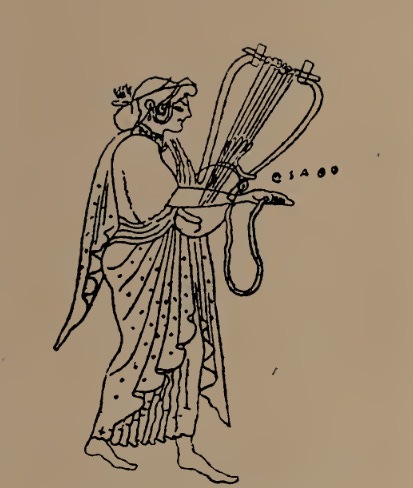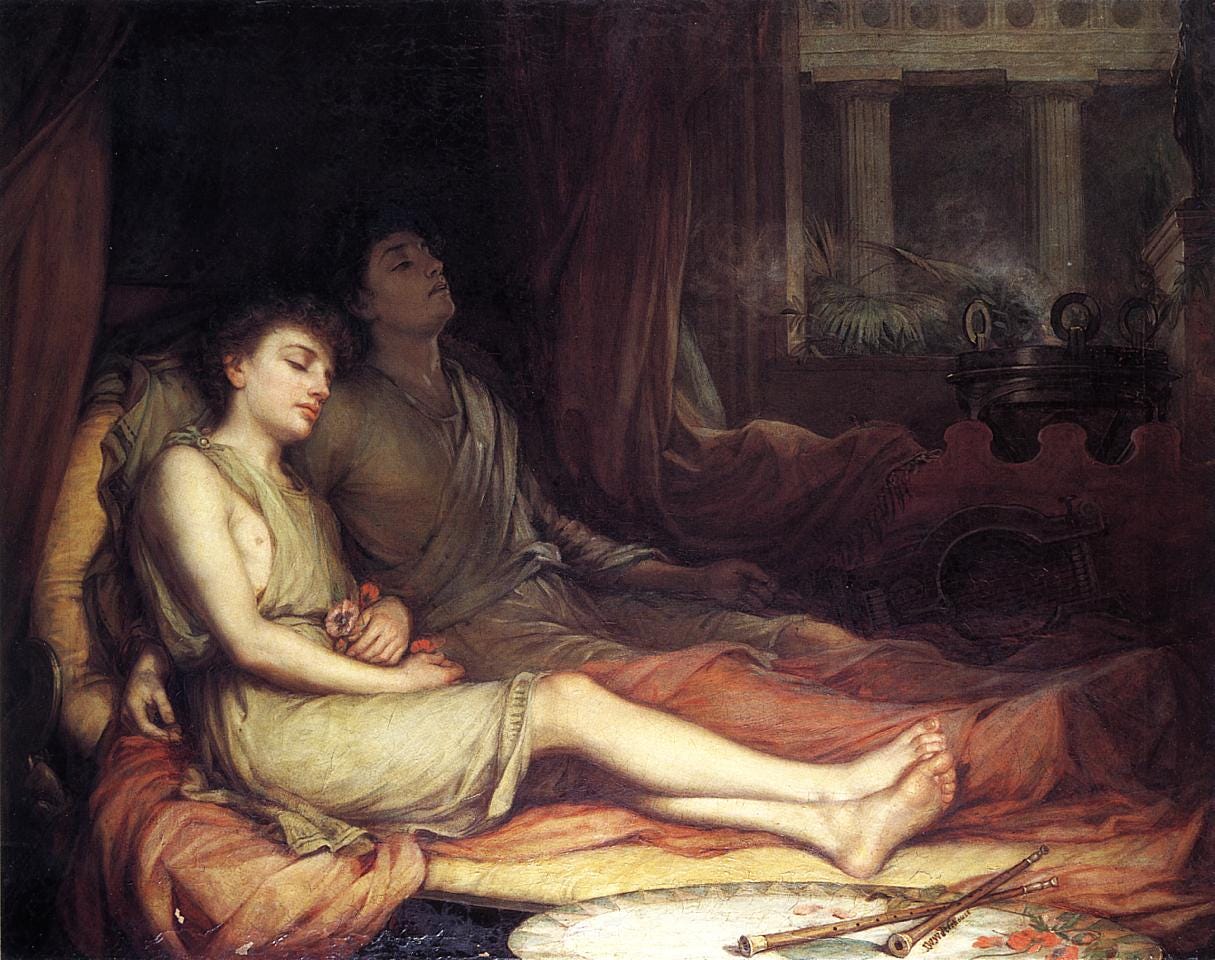"Playthings may not count in, tap out, or call time, but await the pleasure of big hands": A Few Runs at Sappho's Fragment 63
with Claire Catenaccio
Claire Catenaccio is a scholar of Ancient Greek literature and its modern reception. She is a member of the faculty of Classics at Georgetown University.
Fragment 63 of Sappho is preserved on a papyrus roll written around the second century CE and found in Egypt (P. Oxy. 1787). In the first line, Sappho addresses the god Oneiros (Dream) in prayer and conversation. This is the only known piece of literature from the ancient world where a woman relates her own dream. Fragment 63 was originally a poem of ten lines, a relatively short work for Sappho. Unfortunately, the right side of the papyrus is badly damaged, so that only the first portion of each line remains, leaving half of the poem or more unknown.
Claire (a Classics professor) approached Danny (a very occasional poet and pretend translator) with a theory about the missing portions of Fragment 63. Here we present a series of “fantastic collaborations” with Sappho, completing her song. Although some scholars have interpreted this as a dream about Sappho’s coming old age, Claire suggests that the poem instead describes a dream of erotic longing for a lost or absent beloved (and makes this argument in more detail in a forthcoming academic paper, so keep your eyes peeled).
My own (Danny here) process with this fill-in-the-blanks type of work as something a little more than “playing around with” and a little less than “completing.” Our attitudes towards anachronism in Fragment 63 are decided but variable – some of them feel intuitively right, a sort of complementary pairing of resonant-but-distinct perspectives, while others feel barkingly wrong. I’m (Danny again, speaking for myself) always interested in extravagant self-pity, especially in matters romantic, and has enjoyed finding the line between self-serious and ironic expressions of that mood here.
Unless a new papyrus is recovered (check under your couch cushions!), we will never know the full text of Sappho’s Fragment 63. Because there is so little external evidence to assist us in interpreting the fragment, we decided our interpretations would benefit from a bit of creative action.
I.
Ὄνοιρε μελαινα[
φ[ο]ίτας ὄτα τ᾽ ῎Υπνος [
γλύκυς θ[έ]ος, ἦ δεῖν᾽ ὀνίασμ[
ζὰ χῶρις ἔχην τὰν δυναμ[
ἔλπις δε μ᾽ ἔχει μὴ πεδεχη[ν
μηδὲν μακάρων ἐλ[
οὐ γάρ κ᾽ ἔον οὔτω[
ἀθύρματα κα [
γένοιτο δέ μοι[
τοὶς πάντα[
II.
O dream of black [
you roam whenever sleep [
sweet god, indeed me terribly from pain [
through holding your power far apart [
but hope holds me that I not share [
nothing of the blessed ones [
for I would not be so [
playthings [
but may it happen for me [
all things [
III.
O dream of black skies, not moon, not stars, no spill of little light. Take me with you
you roam whenever sleep settles limbs, a closed eye your starting-gun.
Sweet god, indeed – let me sleep, sweet forever, or,
through holding your power far apart, not at all.
But hope holds me that I should not share both, not turn from dreams to day and back again; give me
nothing of the blessed ones seen only by the eyes of sleep, or else crowd my eyes with sight of them.
for I would not be so hard-to-please at dawn, had I not spent the night with
playthings of the lossless gods, tossed with the living and the dead. Those whom death has parted, let them stay parted –
but may it happen for me. May sleep and dreams both drag me back – take me, take
all things, into the great death where Love is.
IV.
O dream of black hair, black lines, and black books –
you roam whenever sleep rolls in, even when I’d rather you stay put.
sweet god, indeed – has no one taught you to distinguish sweetness from pain?
I’m not criticizing, mind – but try holding your power far apart from me – farther than that –
but hope holds me back, that I might not share in the fun of either waking or sleeping,
reunion or severance. nothing of the blessed ones, all the misery of the middle.
for I would not be so much fun for them, if I could pack up my things and go home,
playthings may not count in, tap out, or call time, but await the pleasure of big hands.
but may it happen for me that someone should pack me off the field of play, that
all things in the equipment room should break, along with nails, hearts, etc.
V.
O dream of black eyes, under moonlight: What earthly good does this after-sight do me?
You roam whenever sleep crowds my eyelids. As soon as I go under, you twitch to shamming life.
Sweet God, you take your sweet time. Pain makes a stammerer, and indeed me – terribly – from pain. From me pain, you take. Me hurt. Spit and rinse.
Though holding your power far apart! Holding it far apart from my bleeding mouth, my wasted bed! Withholding, unbloodied, well-rested, flourishing, the whole nine. Drunk and swerving, no signal, tank empty, pedal floored, missing exits – out of your lane, into mine.
I hope – I am held by hope – Hope holds me, tells me not to share my toys with you. Share
nothing of the blessed ones, who give in stint and by halves. Whose guests rise from the table still hungry, scrapped bedmates still lightweight, crackerjack, and run-through.
But may it happen for me that I should sleep again once, or not at all, that
all things be held apart from me, except black hair I can touch, black eyes that can see.





David this is great I have been studying about dolls I lover Rillke essay on dolls and Waltef Benjamens essay I have not started the book The Concil of dolls and a hauntingly eerie island of lost dolls
Rillke said the Dolls are there to be dreamed on I like that statement but above dolls I love The Velvatine Rabbit who wants to be loved and .are real
Sorry long texts thank you beyond thanks peace
This is absolutely fantastic